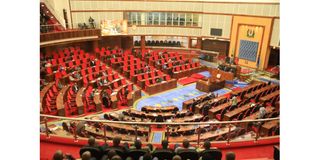Indian High Commission hosts AI session for Tanzanian lawmakers

What you need to know:
- The session, which took place at the parliamentary premises in Dodoma early this week, sought to demonstrate how AI can improve parliamentary operations through practical applications, such as transcription, translation, and record-keeping
Dodoma. The High Commission of India has hosted a workshop for Tanzanian Members of Parliament (MPs) to explore the potential of Artificial Intelligence (AI) in enhancing parliamentary functions.
The session, which took place at the parliamentary premises in Dodoma early this week, sought to demonstrate how AI can improve parliamentary operations through practical applications, such as transcription, translation, and record-keeping.
More than 200 MPs attended the workshop, which provided them with a platform to understand the transformative role of AI in modern governance and legislative processes.
Key figures in attendance also included India’s High Commissioner to Tanzania, Shri Bishwadip Dey; Speaker of the National Assembly, Dr Tulia Ackson; and Deputy Speaker, Mr Mussa Zungu.
The workshop also addressed the importance of implementing ethical standards in the use of AI within legislative frameworks, ensuring that the technology serves the public good.
In his presentation, Professor Raghunathan Rengaswamy, a renowned expert from the Indian Institute of Technology, Madras, emphasised the growing significance of AI in reshaping industries worldwide.
Drawing on his expertise in chemical engineering, Professor Rengaswamy highlighted how AI is increasingly being used to streamline decision-making, reduce operational costs, and enhance efficiency across various sectors.
He noted that AI is central to the future of complex decision-making processes and computer learning.
“AI is not just a tool for automation; it is fundamentally changing how industries operate and make decisions,” Professor Rengaswamy said.
“It is the cornerstone of the future, and its potential within legislative functions is vast.”
Dr Ackson expressed her appreciation for the initiative, describing the workshop as a critical step toward integrating modern technology into the workings of Tanzania’s Parliament.
She pointed out that the adoption of AI could bring significant improvements in efficiency, cutting down both time and manpower costs associated with parliamentary operations.
“This is a significant advancement for Tanzania’s Parliament, and we are committed to exploring how AI can be further integrated into our legislative processes,” Dr Ackson said.
“The potential benefits are clear—greater efficiency, reduced costs, and more streamlined operations for the benefit of the Tanzanian people.”
The session sparked considerable interest among MPs, who showed keen enthusiasm for exploring how AI could revolutionise the Tanzanian government’s approach to legislative work.





